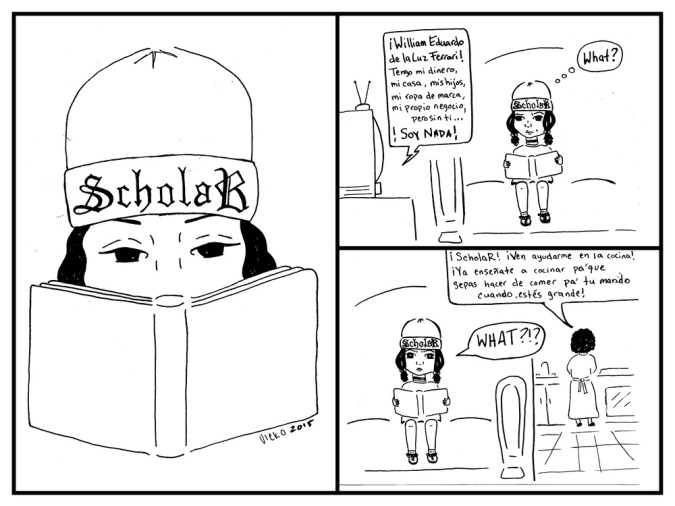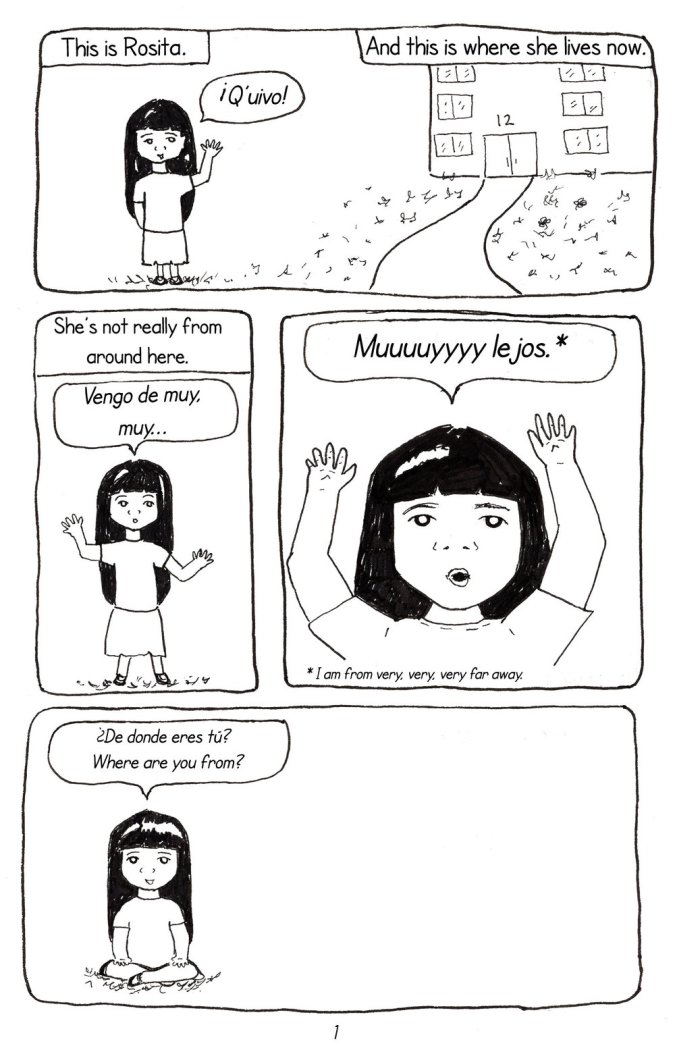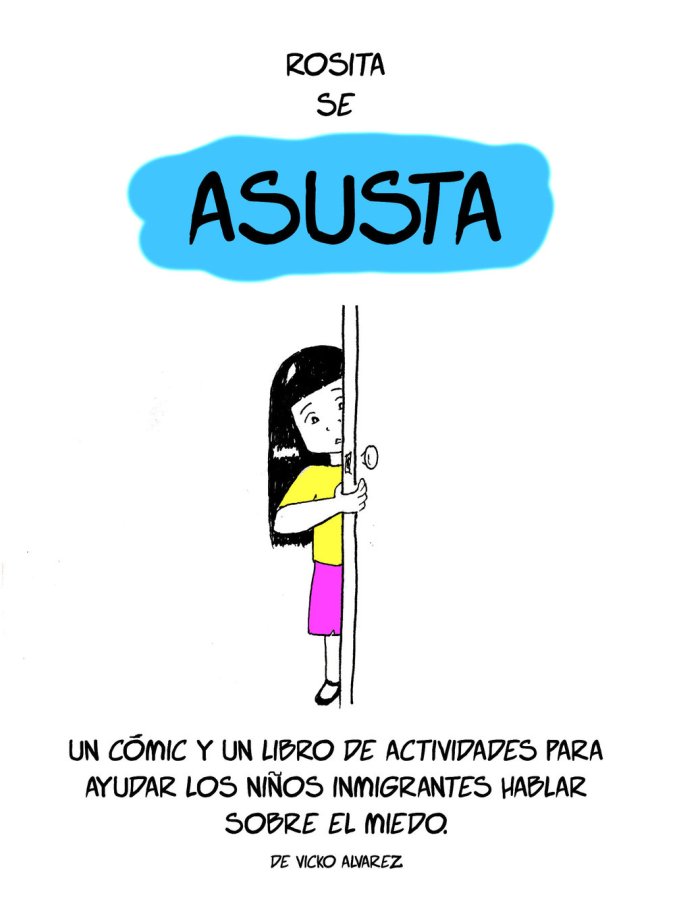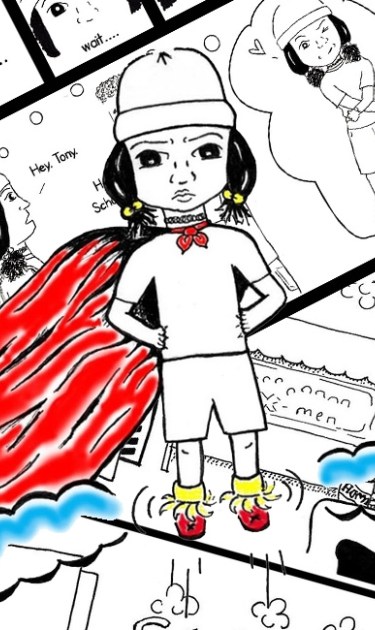Comic books get a bad rap. For the art world’s elite, the cartoons and speech balloons give the impression of immaturity. Some have criticized the medium for supposedly “infantilizing” adults; others have condemned comic book fans for having “no self-respect.” But as illustrious tastemakers disparage comic books as a hobby of the uneducated and juvenile, artist Vicko Alvarez Vega views them as the ideal vehicle for growth and learning. In Chicago, the Mexican-American illustrator/educator uses comics as a teaching tool for low-income youth of color.
“Comics make heavy topics lighter, so that they can be processed,” the 29-year-old artist tells me. “Working with young people who are struggling to read and write, I’ve learned that combining letters and words with pictures that illustrate the text is helpful. It’s basic to education and should be used more.”
“ScholaR represents the girl or boy who grew up in a household where survival comes first and emotions come second, or not at all.”
Alvarez Vega started using comics as a teaching tool in 2015 when she created ScholaR Comics, a series about a working-class nerdy chola navigating girlhood. (On her site, she states that she “stays repping for the hociconas and the off beat nerdas who put the ‘chola’ in ‘scholar.”) In the comic, ScholaR, who’s tough but well-meaning, tries to make sense of her world. While book smart, the young heroine still doesn’t have the proper vocabulary to describe or understand what she’s witnessing. The criminalization of brown men on her block, beauty ideas she doesn’t subscribe to, school policing, immigrant classmates who are othered, and being too poor to take family trips are not things she can easily put into words.
Regardless of her inability to name these situations as examples of institutional racism, sexism, classism, and xenophobia, they don’t sit well with her. But without guidance or conversations with the adults around her, she’s forced to deal with her emotions alone, which sometimes leads to school fights and suspensions.

“ScholaR represents the girl or boy who grew up in a household where survival comes first and emotions come second, or not at all. But she figures it out with the help of her friends,” the Dallas-raised artist says.
Since launching ScholaR Comics, Alvarez Vega has used the series in My Comics, My Story, an after-school program at a middle school in Chicago’s South Side where she intermittently teaches. By identifying the issues the comic’s protagonist encounters with her students, Alvarez Vega creates a space where they, too, become comfortable talking, or drawing, about the difficulties they experience in their own real lives: racial discrimination, educational inequality, gender violence, and questioning their sexual orientation.
“We have this assumption that young people don’t understand what’s happening around them, and that’s just not true,” she says. “They’re living their lives as brown people, too. They’re exploring their sexuality, too. We are the ones who have to get comfortable with this so that we can talk to them and help them through it.”
Alvarez Vega was about the same age as her students when she first became interested in visual art. It started her freshman year of high school when she enrolled in a drawing class. At the time, she mostly painted images of her family, especially the elderly. She became fascinated by the lines and shadow details that went into depicting their wrinkles. During her senior year, she gifted her father a portrait she had painted of his parents. But he didn’t react as she expected; he simply nodded his head and placed the piece in a closet.
“My parents never cared much about my art,” Alvarez Vega adds. “I mean, it makes sense. They were surviving, and my paintings weren’t things that were essential or of practical use.”

Even with ScholaR Comics landing her interviews on Telemundo and speaking engagements throughout the country, her parents remain indifferent to her artwork. She says they didn’t take any interest until August when she released Rosita Gets Scared, a 14-page comic and activity book centered on a young undocumented girl named Rosita, who shares her story and offers advice on how to cope with fear of deportation.
“My mother was like ‘send me two copies,’ and I almost started crying,” Alvarez Vega says. Her mom wanted to give the comic to two young girls back in Texas, who have feared for their families since Donald Trump took office in January.
As the Trump Administration works to deport a larger number of immigrants, including those without criminal records, Rosita Gets Scared is incredibly timely. Alvarez Vega made the comic, which is available in both English and Spanish, specifically for kids caught up in the United States’ broken immigration system. The comic is for the girl who turns on her TV to watch cartoons but sees an alarming news segment about an Immigration and Customs Enforcement (ICE) raid or for the son who joins his mother for an immigration check, knowing she could end up at a detention center. Alvarez Vega wants the activity book to help undocumented youth, or the children of immigrants, understand what’s happening around them and talk about their feelings with their loved ones.

“There’s this whole generation of younger people who are seeing everything we are but don’t have the tools to process it.”
“There’s this whole generation of younger people who are seeing everything we are but don’t have the tools to process it. They’re seeing the news sensationalize everything for views and creating a constant state of emergency,” she says. “As adults, we understand how to handle ourselves. But this sends children into a panic, especially as they think about that uncle who doesn’t have papers. They start to worry that something will happen to him. They need tools to manage their emotions.”
Rosita Gets Scared is part of a new series Alvarez Vega created to address emotions specific to youth of color. While the story of Rosita, who is also a character in the ScholaR Comics, centers on the fear of deportation, a later one will focus on Masir, a black Puerto Rican-Palestinian student in the comic who is anxious about criminalization in school. It’s Alvarez Vega’s hope that the comics and activity books can provide teaching tools for culturally relevant social and emotional learning.
“Young people need to be educated as much as we do,” she says. “With more education will hopefully come less fear. We just need a way to translate these things to them, and comics can do that.”
Head over to ScholaR Comics to preview the series and purchase an issue.




